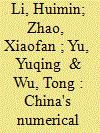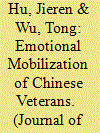|
|
|
Sort Order |
|
|
|
Items / Page
|
|
|
|
|
|
|
| Srl | Item |
| 1 |
ID:
150670


|
|
|
|
|
| Summary/Abstract |
In China, the national target for energy intensity reduction, when integrated with target disaggregation and information feedback systems, constitutes a numerical management system, which is a hallmark of modern governance. This paper points out the technical weaknesses of China's current numerical management system. In the process of target disaggregation, the national target cannot be fully disaggregated to local governments, sectors and enterprises without omissions. At the same time, governments at lower levels face pressure for reducing energy intensity that exceeds their respective jurisdictions. In the process of information feedback, information failure is inevitable due to statistical inaccuracy. Furthermore, the monitoring system is unable to correct all errors, and data verification plays a limited role in the examination system. To address these problems, we recommend that the government: use total energy consumption as the primary indicator of energy management; reform the accounting and reporting of energy statistics toward greater consistency, timeliness and transparency; clearly define the responsibility of the higher levels of government.
|
|
|
|
|
|
|
|
|
|
|
|
|
|
|
|
| 2 |
ID:
178745


|
|
|
|
|
| Summary/Abstract |
Based on in-depth interviews of Chinese veterans and specifically focusing on the cadets in Shanghai, this article explores the mechanism of emotional mobilization of this highly organized contentious group vis-à-vis other disorganized and dispersive one such as labors and homeowners. It reveals that strong emotional ties with comrades in troops and the despondency brought about by the Chinese Communist Party’s (CCP) ineffective redress to their demands have rendered Chinese veterans, who see themselves rhetorically glorified and embodying heroic status in the country, protesting for their military identity and military rank recovery for decades. In order to defuse veterans’ grievances, flexible governance, which stresses emotional care and affection by petition social workers, is deployed by the Party-state to settle disputes that beyond law and policy.
|
|
|
|
|
|
|
|
|
|
|
|
|
|
|
|
| 3 |
ID:
160456


|
|
|
|
|
| Summary/Abstract |
This article finds that the innovative practice of involving social workers in settling petition disputes in Shanghai is a kind of “flexible governance” stressing affective care and multi-pronged means of dispute resolution to relieve petition pressures and maintain social stability in the authoritarian state.
|
|
|
|
|
|
|
|
|
|
|
|
|
|
|
|
| 4 |
ID:
186621


|
|
|
|
|
| Summary/Abstract |
A key means of consolidating the Chinese Communist Party's (CCP) ruling basis and enhancing its resilience and political leadership is to establish primary party organizations (PPOs) at the grassroots level. Drawing on the case of the Aixin Social Work Service Center in Jiangsu Province, this article interrogates the rationale and mechanism of party-building in social organizations in China. A concept of "party-building absorption of society" is raised to explore how the "red social worker" is created and trained by the party-state. Four mechanisms are found to be adopted by the CCP to build PPOs in social organizations, i.e., goal-compatibility, co-optation/exclusion, liaison, and competition. It reveals that although the CCP can turn non-government organizations (NGOs) red and reinforce social control and surveillance over them through party-building, it would reshape the state-society relations through transactional governance and may fail to realize social actors' ideological identification with the party.
|
|
|
|
|
|
|
|
|
|
|
|
|
|
|
|
| 5 |
ID:
158659


|
|
|
|
|
| Summary/Abstract |
The Chinese Communist Party faces a dilemma in local community governance, i.e. state intervention vs. community self-governance. Increased intervention violates its long-promoted social self-governance and undermines the regimes’ credibility and legitimacy, while less intervention may add to the risk of social instability and collective actions at the local level. Therefore, selective intervention is applied by local government as a rational choice in community governance. This article explores the political rationale of local governments’ selective intervention in community disputes in urban China. The authors argue that the type of community, the degree of homeowners’ solidarity and the media exposure significantly affect the likelihood and degree of a local state’s intervention as well as the local government’s response in the dispute resolution.
|
|
|
|
|
|
|
|
|
|
|
|
|
|
|
|
|
|
|
|
|